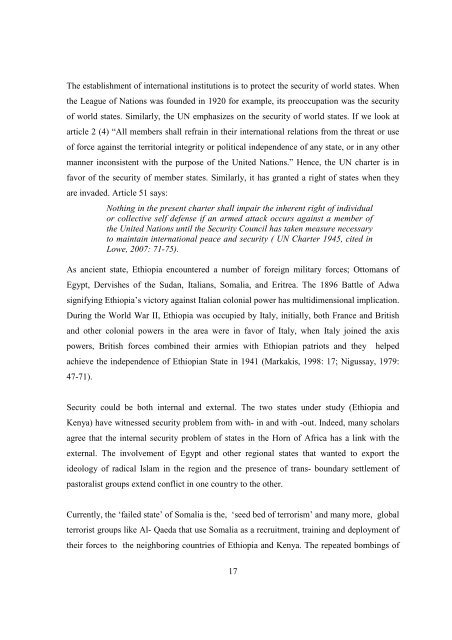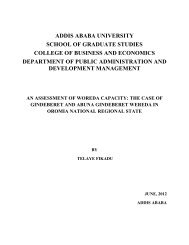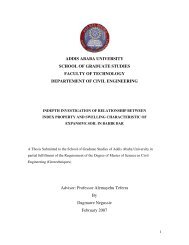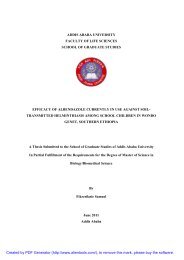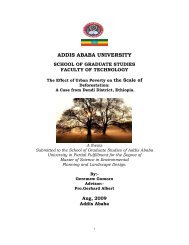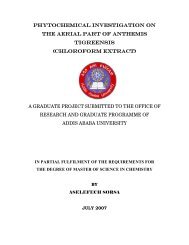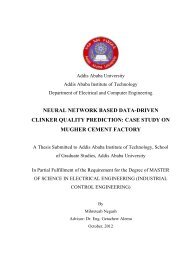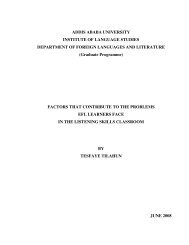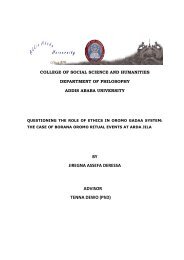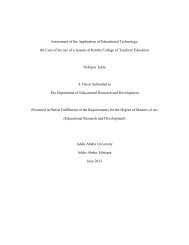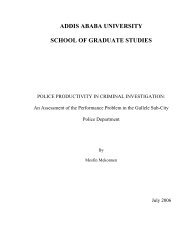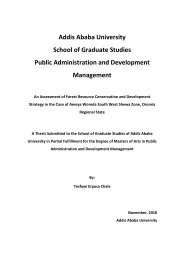HENOK MERHATSIDK 1.pdf - Addis Ababa University
HENOK MERHATSIDK 1.pdf - Addis Ababa University
HENOK MERHATSIDK 1.pdf - Addis Ababa University
Create successful ePaper yourself
Turn your PDF publications into a flip-book with our unique Google optimized e-Paper software.
The establishment of international institutions is to protect the security of world states. When<br />
the League of Nations was founded in 1920 for example, its preoccupation was the security<br />
of world states. Similarly, the UN emphasizes on the security of world states. If we look at<br />
article 2 (4) “All members shall refrain in their international relations from the threat or use<br />
of force against the territorial integrity or political independence of any state, or in any other<br />
manner inconsistent with the purpose of the United Nations.” Hence, the UN charter is in<br />
favor of the security of member states. Similarly, it has granted a right of states when they<br />
are invaded. Article 51 says:<br />
Nothing in the present charter shall impair the inherent right of individual<br />
or collective self defense if an armed attack occurs against a member of<br />
the United Nations until the Security Council has taken measure necessary<br />
to maintain international peace and security ( UN Charter 1945, cited in<br />
Lowe, 2007: 71-75).<br />
As ancient state, Ethiopia encountered a number of foreign military forces; Ottomans of<br />
Egypt, Dervishes of the Sudan, Italians, Somalia, and Eritrea. The 1896 Battle of Adwa<br />
signifying Ethiopia’s victory against Italian colonial power has multidimensional implication.<br />
During the World War II, Ethiopia was occupied by Italy, initially, both France and British<br />
and other colonial powers in the area were in favor of Italy, when Italy joined the axis<br />
powers, British forces combined their armies with Ethiopian patriots and they helped<br />
achieve the independence of Ethiopian State in 1941 (Markakis, 1998: 17; Nigussay, 1979:<br />
47-71).<br />
Security could be both internal and external. The two states under study (Ethiopia and<br />
Kenya) have witnessed security problem from with- in and with -out. Indeed, many scholars<br />
agree that the internal security problem of states in the Horn of Africa has a link with the<br />
external. The involvement of Egypt and other regional states that wanted to export the<br />
ideology of radical Islam in the region and the presence of trans- boundary settlement of<br />
pastoralist groups extend conflict in one country to the other.<br />
Currently, the ‘failed state’ of Somalia is the, ‘seed bed of terrorism’ and many more, global<br />
terrorist groups like Al- Qaeda that use Somalia as a recruitment, training and deployment of<br />
their forces to the neighboring countries of Ethiopia and Kenya. The repeated bombings of<br />
17


